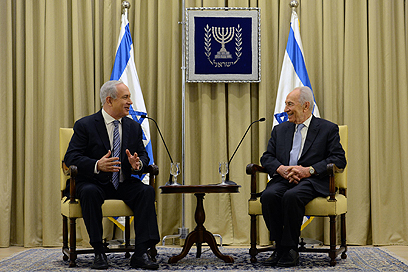
Netanyahu granted extension to form government
President Peres gives PM 14-day negotiation extension. Netanyahu, in thinly veiled criticism of Yesh Atid-Habayit Hayehudi pact, says delay is due to 'some parties boycotting others'
Prime Minister Benjamin Netanyahu met with President Shimon Peres on Saturday evening and officially asked him for an extension in order to form the new government. Peres granted the request.
In a short press conference held in the President's Residence following the meeting, Netanyahu criticized what he called the "boycott" imposed by certain parties on others.
Related stories:
- Livni's Hatnuah is first to enter coalition
- Likud hints: Haredim may be excluded from gov't
- Lieberman: Bennett, Lapid our natural partners
"The main reason I have not been able to finish forming the coalition until now is – and I'll say this as plainly as possible – the fact that certain parties are boycotting others.
"There's a boycott against a sector in Israel and this goes against my views," he said, in thinly veiled criticism of the political pact between Yesh Atid and Habayit Hayehudi, which states that they will not join a coalition that includes the haredi parties.

Netanyahu and Peres (Photo: GPO)
"I am doing everything within my power to unite the people. I think that we, as Jews who have suffered from bans, we cry out in protest when Israel is shunned in international forums – as we should. We protest when settlers in Judea and Samaria have to deal with product boycotts – as we should. So the people who have to be the most sensitive to this issue are the settlers.
"Our history," he continued, "Is riddled with tragedies caused by unfounded hatred and internal fighting. Today, when we look around and see the myriad of challenges around us – security challenges, the challenges posed by the need to hold a responsible peace process – I believe these challenges require that we stand united, not divided."
'Democracy takes effort'
"After seeking legal advice and hearing how the negotiations are going and what you have done so far, I believe you are the man who should form the government," Peres told Netanyahu in the press conference.
"I was glad to learn that you believe that you have a good chance of forming a coalition within the next two weeks. I have no doubt that Israel needs a stable government that would be able to deal with the social and security challenges ahead.
"We are a democracy and democracy takes effort. I hereby grant you a two-week extension to form the coalition and bid you good luck," the president concluded.
The customary 28-day timeframe afforded to the prime minister after the Likud's election win, elapsed over the weekend.
Israel's Election Act, as well as Basic Law: The Government, state that the winning candidate is allowed to petition the president for an additional 14 days to complete the task, should the initial timeframe prove insufficient.
According to the law, should Netanyahu fail to form a government at the end of his 14-day extension, Peres could task another candidate with the responsibility.
In the event that the president does ask another candidate to form the government and he or she fails as well, a new general elections would be called.
Naftali Bennett was quick response to Netanyahu's criticism, via his Facebook page, saying it was the Likud-Beiteinu's negotiation team that is responsible for the disconnect.
"We expected to be the first, and most natural, partner to enter Netanyahu's government. We recommended that he be tasked with forming the government sans any preconditions. The Likud, however, sent us a clear message – 'there is no way the religious-Zionism party will be part of the government.'"
Despite the mutual gabbing, Netanyahu and Bennett have agreed to meet on Sunday in another attempt to resolve the stalemate plaguing the coalition negotiations.
- Receive Ynetnews updates directly to your desktop










